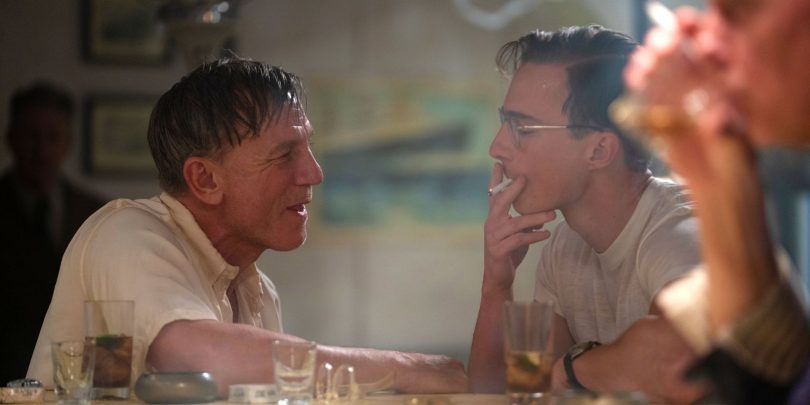I haven’t read the William S. Burroughs novel that Queer is adapted from, but if you told me Luca Guadagnino had gutted it and started from scratch, I’d believe you. His latest movie seems to me to be in clear conversation with his previous work, as if the sensibilities of his four previous features were combined in one movie. It’s an enigmatic experience that I desperately want to spend this space interpreting. But I will refrain from going into too much detail and just offer up the lens I saw it through.
In 1950s Mexico City, American expat William Lee (Daniel Craig) cruises for young men to sleep with. There is a method to sussing out a willing partner, and for Lee, that means keeping verbal communication to a minimum. If he’s talking, as with the freckled Jewish boy in the opening scene, things aren’t going too well. But we see what it looks like when he succeeds, and his reaching for a man’s necklace in feigned curiosity is met with a hand sliding up his thigh.
Daniel Craig Does Some Career-Best Work In Queer
The movie’s real theme is buried in his performance
This makes fellow American Eugene Allerton (Drew Starkey) particularly vexing. Their eyes meet across, ahem, a cockfight, and they seem to connect. When they talk, things are friendly, even flirty. But he seems pretty friendly with another woman, too. Not knowing seems painful for Lee. His lust manifests physically as a kind of desperation, almost like an illness. Joe (Jason Schwartzman), Lee’s friend and brother-in-arms of sorts, reminds him he can always ask, but that would seem to ruin whatever he’s really after.
Though Lee appears to live openly, self-loathing courses beneath Craig’s performance (among his career best), occasionally peeking out in dialogue. And something about Gene makes him the ultimate fix.
Form and content are subtly in step in these early scenes. While daylight is stark and demystifying, the world around these characters gets slightly unreal at night, tinted with dreamy blues and violets. Our attunement to the physical body is heightened as well, in classic Guadagnino fashion. Starkey is almost always artfully composed, but Craig alternates from suave and collected to a sweaty mess with sunken eyes. The more Lee strikes out, the worse he looks, but the healing intimacy of a successful evening bleeds over into the cinematography.
10 Best Drama Movies Of 2024
Although it has been a challenging year for movies, several feature-length dramas stand out as must-watch fare — and some of the best movies of 2024.
To tread into the realm of meaning, this oscillation in Lee’s physical state is crucial to understanding his relationship with his homosexuality. He struggles with drug use, but this is less a direct explanation of his behavior than a way of getting us to conflate queerness and addiction, the way I believe this character does. Though Lee appears to live openly, self-loathing courses beneath Craig’s performance (among his best), occasionally peeking out in dialogue. And something about Gene makes him the ultimate fix.
Queer Gets More & More Surreal As It Goes
Including the trippiest imagery of Luca Guadagnino’s career
He brings up, initially in passing, what he’s read about a drug called yage, discovered in the South American rain forest. It supposedly enhances one’s natural telepathic ability; the Soviets have been testing it out in mind control experiments. Lee’s interest in yage becomes an increasingly important part of Queer, though exactly why he’s after it is, for a long time, unclear. He would like a stronger hold on Gene, who is fickle with his attention. Would telepathy help him do that? Would mind control?
I greatly admire what Guadagino and his collaborators have accomplished with this film. It’s as rewarding as it is challenging.
Guadagnino makes this a subject of constant interpretation. As yage becomes a greater focus, Queer leans into surreal imagery, specifically through dreams. The images the movie conjures are among the most striking of the director’s filmography, often channeling the visceral physicality of Suspiria and Bones and All. In these dreams are the keys to Lee’s psyche, and I’d recommend doing the work of unpacking them early, if just to flex that muscle. You will need it warmed up by the time Queer comes to an end.
I greatly admire what Guadagino and his collaborators have accomplished with this film. It’s as rewarding as it is challenging; it’s possible that, with time, I will come to like it even more. I believe it’s ultimately about self-acceptance, or, more accurately, the transcendence of one’s self-denial. That is by no means the only reading available, though, and I very much look forward to seeing what shapes Queer takes when others do the work of untangling it.
Queer premiered at the Venice Film Festival. The film is 135 minutes long and not yet rated.







